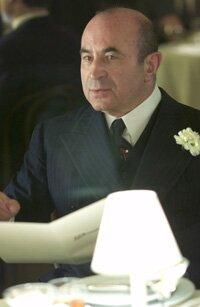 It's been a long time since we've seen a new entry for That Guy!, the Screengrab's sporadic celebration of B-listers, character actors, and the working famous. So who better to mark our return than one of the most enjoyable contemporary character actors? Robert William Hoskins, the short, broad Cockney from Bury St. Edmonds, is one of England's most beloved actors -- quite unusual given that he's never had an acting lesson and his first role came purely by accident. At the time, Hoskins was seeking a career as a writer, and supported himself, like most failed artists, by working odd jobs -- in this case, as a warehouse worker. Showing up drunk and a theater to collect a friend who was auditioning for the lead, he was clowning around in the audience and, mistaken for one of the hopefuls by the casting director, he acquitted himself marvelously in the audition and got the part. It cost him a friend, but it launched one of the richest careers in modern British cinema. At 5'6", stout, and with an unmistakable working-class accent and demeanor, Hoskins is rarely the best-looking man in the room, even when he's alone; but he's parlayed his unusual appearance and forceful personality into some electrifying roles. At first known for his ability to play intense and sometimes brutal criminals and assorted villains, he later convinced his agents that he was more diverse than his resume indicated and soon showed an exceptional gift for comedy as well, both verbal and physical. His big break came in 1980, when, after a number of high-profile television appearances, he netted the lead role in The Long Good Friday (about which see below); it proved to be a turning point in his career, and he's worked steadily ever since, rarely in a lead role but always worth watching (well, maybe with the exception of Super Mario Brothers). With both blockbuster films and small independent movies to his credit, Hoskins has proven his diversity, and even now, at age 65, he gets offers that men half his age would envy. Curiously, he has played a number of political leaders from the 1940s and 1950s in his storied career: Churchhill, Mussolini, Krushchev, and Soviet secret police killer Lavrent Beria. Of this phenomenon, Hoskins has said, with typical self-deprecation, "Most dictators were short, fat, middle-aged and hairless. Besides Danny DeVito, there's only me to play them."
It's been a long time since we've seen a new entry for That Guy!, the Screengrab's sporadic celebration of B-listers, character actors, and the working famous. So who better to mark our return than one of the most enjoyable contemporary character actors? Robert William Hoskins, the short, broad Cockney from Bury St. Edmonds, is one of England's most beloved actors -- quite unusual given that he's never had an acting lesson and his first role came purely by accident. At the time, Hoskins was seeking a career as a writer, and supported himself, like most failed artists, by working odd jobs -- in this case, as a warehouse worker. Showing up drunk and a theater to collect a friend who was auditioning for the lead, he was clowning around in the audience and, mistaken for one of the hopefuls by the casting director, he acquitted himself marvelously in the audition and got the part. It cost him a friend, but it launched one of the richest careers in modern British cinema. At 5'6", stout, and with an unmistakable working-class accent and demeanor, Hoskins is rarely the best-looking man in the room, even when he's alone; but he's parlayed his unusual appearance and forceful personality into some electrifying roles. At first known for his ability to play intense and sometimes brutal criminals and assorted villains, he later convinced his agents that he was more diverse than his resume indicated and soon showed an exceptional gift for comedy as well, both verbal and physical. His big break came in 1980, when, after a number of high-profile television appearances, he netted the lead role in The Long Good Friday (about which see below); it proved to be a turning point in his career, and he's worked steadily ever since, rarely in a lead role but always worth watching (well, maybe with the exception of Super Mario Brothers). With both blockbuster films and small independent movies to his credit, Hoskins has proven his diversity, and even now, at age 65, he gets offers that men half his age would envy. Curiously, he has played a number of political leaders from the 1940s and 1950s in his storied career: Churchhill, Mussolini, Krushchev, and Soviet secret police killer Lavrent Beria. Of this phenomenon, Hoskins has said, with typical self-deprecation, "Most dictators were short, fat, middle-aged and hairless. Besides Danny DeVito, there's only me to play them."
Where to see Bob Hoskins at his best:
THE LONG GOOD FRIDAY (1980)
Hoskins' breakout film role came in this gripping, suspenseful gangster movie, which he earned by a stellar performance in Dennis Potter's fantastic television mini-series Pennies from Heaven. Playing Harold Shand, a short-tempered and violent British gangster, Hoskins is endlessly fascinating to watch: his character, used to being in complete control, is a textbook case of slow, angry boil as his world begins to completely unravel on what should be the occasion of his greatest triumph. Watching Shand fall to pieces as he thrashes about helplessly, trying to find out who is out to destroy him and why, is one the greatest treats the gangster genre has to offer.
Read More...